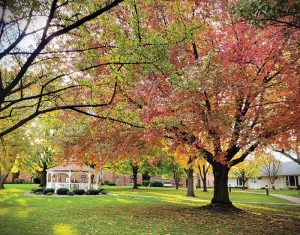November 25, 2025
Aging and You
 By Julie Arndt
By Julie Arndt
Marketing Director at Ridgecrest Village
Planned Giving: Making an Impact This November
How Thoughtful Contributions This Season Can Shape the Future
As November arrives, many individuals and organizations reflect on gratitude, generosity, and legacy. The season is synonymous with giving thanks and supporting causes close to our hearts. One impactful way to do this is through planned giving, a philanthropic approach that offers benefits to both donors and the organizations they support. Before working here, I was unaware that Ridgecrest Village is among the many not-for-profit organizations in the Quad Cities that rely on and value such contributions. Additionally, the Ridgecrest Foundation, a separate nonprofit organization, was established in 1997 with the creation of the Koning Fund, which was designed to provide financial assistance to LifeCare residents. Since then, the Foundation has grown to include additional funds, such as the Educational Assistance Program and the General Fund, with an Emergency Fund soon to be added, all working together to enhance, enrich, engage, and support the mission of those living at Ridgecrest Village,” said Ridgecrest Foundation Director, Jenny Kitsis.
Planned giving, sometimes called legacy giving, refers to charitable donations that are arranged in advance, often as part of a donor’s financial or estate planning. These gifts may be made during a donor’s lifetime or as bequests upon their passing. Planned giving can include gifts of cash, securities, real estate, life insurance policies, or retirement assets.
November is a time when charitable organizations launch appeals and campaigns to coincide with the giving spirit of Thanksgiving. For individuals, it’s an ideal moment to review personal goals, financial strategies, and the impact you wish to make. The end of the calendar year also brings tax planning opportunities, so thoughtful giving in November can maximize potential benefits for donors and causes alike.
Kitsis noted, “What so many people don’t realize is that planned giving isn’t just for the wealthy—it’s for anyone who wants to make a difference in a way that reflects their values. Whether it’s a small percentage in a will or designating a charity as a beneficiary, every planned gift leaves a meaningful legacy.”
She continued, “There are many ways people can help.”
- Bequests: Designating a charity in your will or trust.
- Charitable Gift Annuities: Providing income for life in exchange for a gift.
- Donor-Advised Funds: Setting aside funds to be distributed to charities over time.
- Beneficiary Designations: Naming a charity as a beneficiary on retirement accounts or life insurance.
- Real Estate or Stock Gifts: Donating appreciated assets for immediate or future benefit.
- Planned giving allows donors to make a lasting impact, often enabling larger gifts than might be possible otherwise. Certain planned gifts provide income during retirement, potential tax savings, and the satisfaction of creating
Julie Arndt, is a licensed social worker and Director of Marketing at Ridgecrest Village with over 30 years’ experience working in the field of geriatrics and senior advocacy. She can be reached at jarndt@ridgecrestvillage.org.
Filed Under: Finance, Retirement
Trackback URL: https://www.50pluslife.com/2025/11/25/aging-and-you-32/trackback/


